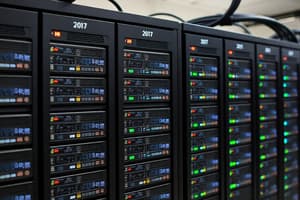Podcast
Questions and Answers
What is the primary function of schema attributes in Active Directory?
What is the primary function of schema attributes in Active Directory?
- To define types of objects
- To store user passwords
- To manage security settings
- To define what type of information is stored in each object (correct)
A container object in Active Directory cannot store other objects.
A container object in Active Directory cannot store other objects.
False (B)
Name the three types of container objects found in Active Directory.
Name the three types of container objects found in Active Directory.
Organizational Units, Folder Objects, Domain objects
An __________ is a primary container object for organizing resources in a domain.
An __________ is a primary container object for organizing resources in a domain.
Match the following container objects with their description:
Match the following container objects with their description:
What purpose does the Active Directory Schema serve?
What purpose does the Active Directory Schema serve?
The Active Directory Administrative Center (ADAC) can only manage users and computers in the same domain.
The Active Directory Administrative Center (ADAC) can only manage users and computers in the same domain.
What can an administrator do using the Active Directory Administrative Center (ADAC)?
What can an administrator do using the Active Directory Administrative Center (ADAC)?
The schema in Active Directory defines the types of __________ that can be stored.
The schema in Active Directory defines the types of __________ that can be stored.
Match the following Active Directory tasks with their descriptions:
Match the following Active Directory tasks with their descriptions:
What is the primary role of Active Directory in a business environment?
What is the primary role of Active Directory in a business environment?
Active Directory only allows authentication for local resources.
Active Directory only allows authentication for local resources.
What are the components of Active Directory's physical structure?
What are the components of Active Directory's physical structure?
Active Directory can be described as a __________ but __________ database.
Active Directory can be described as a __________ but __________ database.
Match the following features of Active Directory with their descriptions:
Match the following features of Active Directory with their descriptions:
Which of the following is NOT a feature of Active Directory?
Which of the following is NOT a feature of Active Directory?
Active Directory is exclusively used for managing user data.
Active Directory is exclusively used for managing user data.
Define what a directory service does in a network.
Define what a directory service does in a network.
Which of the following is NOT a type of leaf object commonly created in Active Directory?
Which of the following is NOT a type of leaf object commonly created in Active Directory?
A local user account can access resources on multiple computers in the domain.
A local user account can access resources on multiple computers in the domain.
What are the two built-in user accounts created by Windows?
What are the two built-in user accounts created by Windows?
A group object in Active Directory represents a collection of users with common ______.
A group object in Active Directory represents a collection of users with common ______.
Match the following objects with their definitions:
Match the following objects with their definitions:
What is the primary purpose of a group object in Active Directory?
What is the primary purpose of a group object in Active Directory?
Authentication in Active Directory does not involve confirming a user’s identity.
Authentication in Active Directory does not involve confirming a user’s identity.
What type of account provides a single logon for users to access all resources in the domain?
What type of account provides a single logon for users to access all resources in the domain?
What does the first domain controller create upon its installation?
What does the first domain controller create upon its installation?
Intrasite replication occurs between domain controllers in different locations.
Intrasite replication occurs between domain controllers in different locations.
What mechanism does Active Directory use to determine the replication topology?
What mechanism does Active Directory use to determine the replication topology?
The first domain controller installed in a forest is designated as a __________.
The first domain controller installed in a forest is designated as a __________.
Match the Active Directory replication type with its description:
Match the Active Directory replication type with its description:
What primary function does the Global Catalog server NOT perform?
What primary function does the Global Catalog server NOT perform?
Larger organizations typically only focus on Organizational Units (OUs) for their Active Directory structure.
Larger organizations typically only focus on Organizational Units (OUs) for their Active Directory structure.
What is the main purpose of Active Directory replication?
What is the main purpose of Active Directory replication?
Flashcards are hidden until you start studying
Study Notes
Role of Active Directory
- Active Directory is a centralized authentication and authorization service from Microsoft.
- It helps control user access to data and enforce company security policies.
Active Directory Features
- Active Directory provides a hierarchical organization of network resources.
- It utilizes a centralized but distributed database structure allowing for scalability.
- It emphasizes security, flexibility, and policy-based administration.
Directory Service
- A directory service stores and manages information about a computer network.
- It provides features for retrieving and managing this information.
- It is considered an administrative tool.
Active Directory Structure
- It consists of physical structures such as sites and servers acting as domain controllers.
- It also includes logical structure which defines the organization's look and feel within the directory service.
Working with Active Directory
- The Active Directory Administrative Center (ADAC) is used for managing and creating user, group, and computer accounts.
- It also allows managing Organizational Units (OUs).
- Using ADAC, you can connect to other domain controllers within the same or a different domain.
- It enables changing the domain's functional level and activating the AD Recycle Bin.
Active Directory Schema
- An object is a data grouping that describes a network resource.
- The schema defines the object types, organization, and structure of data stored within the AD database.
- Schema classes define the types of objects that can be stored in Active Directory.
- Schema attributes define the information stored in each object.
- The information within each attribute is called the attribute value.
Active Directory Container Objects
- Container objects hold other objects.
- They serve to organize and manage users and resources within the network.
- They act as administrative and security boundaries.
- There are three main types of container objects in AD: Organizational Units (OUs), Folder Objects, and Domain Objects.
Organizational Units (OUs)
- OUs are primary container objects for organizing and managing resources within a domain.
- OUs can organize multiple objects into logical administrative groups.
- They can be configured with specific policies relevant to the group.
- The authority of an OU can be delegated.
Other Leaf Objects
- Some leaf objects commonly created in AD include:
- Contact - a person associated with the company but not a network user.
- Printer - represents a shared printer within the domain.
- Shared Folder - represents a shared folder on a computer within the network.
User Accounts
- User account objects include information like group memberships, account restrictions, profile path, and dial-in permissions.
- Authentication confirms the user's identity.
- Once identity is confirmed, permissions and rights are assigned.
- Local user accounts are authorized to access resources only on a specific computer.
- Domain user accounts provide a single login for users to access all resources within the domain.
- Windows creates two built-in user accounts: Administrator and Guest.
Groups
- A group object represents a collection of users with shared permissions or rights.
- Permissions define the level of access users have to resources.
- Rights specify the types of actions a user can perform within a network or on a computer.
- Groups simplify the process of assigning permissions and rights to members.
Computer Accounts
- A computer account object represents a computer that acts as a domain controller or domain member.
- It's used to identify, authenticate, and manage computers within the domain.
Forests, Trees, and Domains
- Smaller organizations typically focus on OUs and their child objects.
- Larger organizations might require an AD structure composed of multiple domains, trees, and forests.
- The initial domain controller installation creates a new domain, tree, and serves as the root for a new forest.
Active Directory Replication
- Replication maintains a consistent database of information when the database is distributed across locations.
- Intrasite replication is between domain controllers within the same site.
- Intersite replication occurs between two or more sites.
- Multimaster replication is used for replacing AD objects within the directory service.
- The Knowledge Consistency Checker (KCC) runs on all DCs, determining the replication topology.
Global Catalog Server
- The first domain controller installed in a forest is automatically designated as a Global Catalog server.
- Global Catalog servers have these key functions:
- They facilitate domain and forest-wide searches.
- They enable logon access across domains.
- Users can log on to computers in any domain using their user principal name (UPN).
Studying That Suits You
Use AI to generate personalized quizzes and flashcards to suit your learning preferences.



